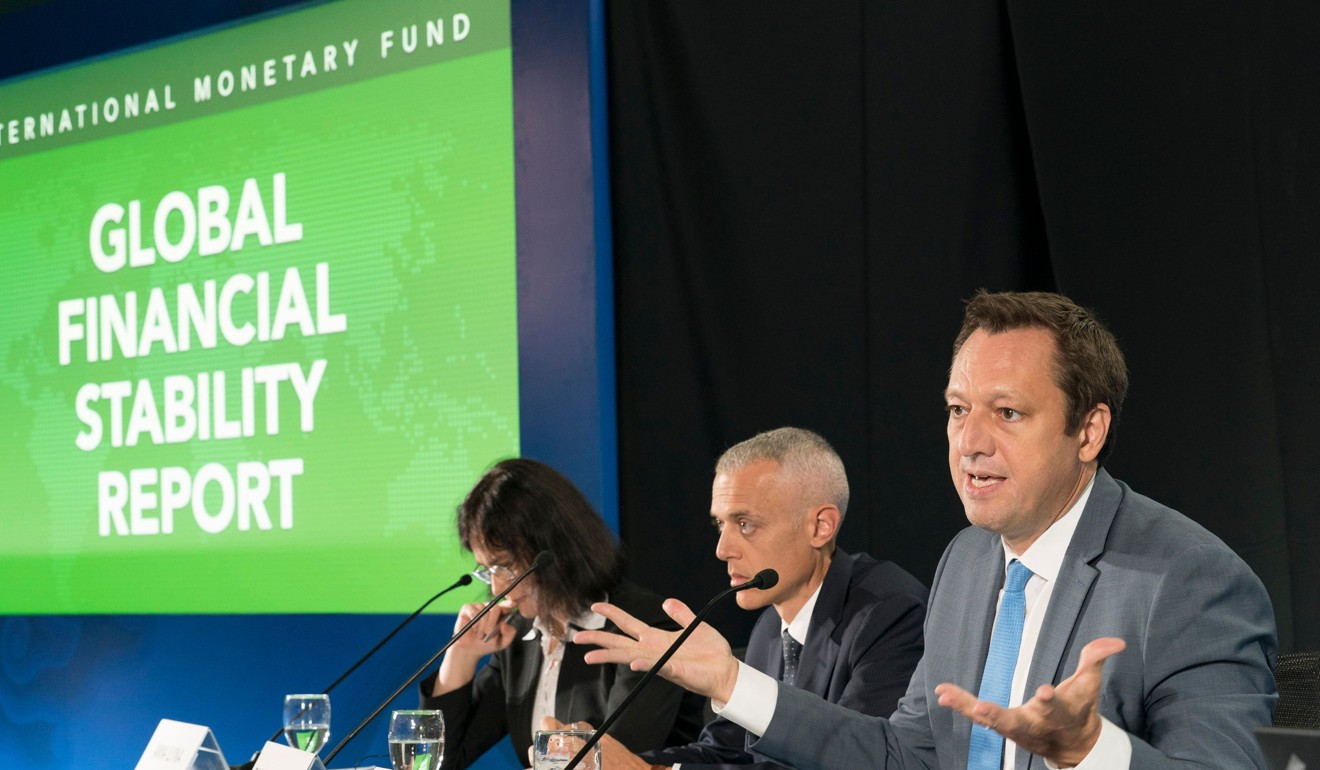
IMF warns of broad ‘market correction’ from global trade tensions
5 per cent probability for emerging markets facing debt outflows of US$100 billion in the next year, it says
An escalation in global trade tensions, together with rising geopolitical risks and policy uncertainty in major economies, could trigger a broad-based correction in global capital markets and cause a sharp tightening of global financial conditions, the International Monetary Fund (IMF) warned on Wednesday.
“Should market participants start pricing in the possibility of protracted trade tensions, financial conditions could tighten significantly, increasing the tail risk to global growth and financial stability,” according to Global Financial Stability Report issued by the IMF at its annual meetings in Bali.
Based on the trade tariffs already in place, the organisation revised down its estimates of world growth this year and next by 0.2 of a percentage point to a still healthy 3.7 per cent. But growth could weaken significantly further if additional trade protectionist measures are put in place, it said.
It warned Chinese organisations with significant exposure to proposed US tariffs, including those engaged in machinery, capital goods, and automotive, have been disproportionately affected by the trade war. The benchmark Shanghai Composite Index has already plunged 17.7 per cent this year, making the Chinese equity market the second worst stock market worldwide, only next to the Greek market, which has fallen 18.4 per cent.

US companies with large sales to China have also underperformed this year, the IMF noted.
Broadly speaking, global financial conditions remain accommodative and supportive of near-term growth, albeit somewhat tighter than six months ago.
The risk of a global financial crisis initiated by sharp capital outflows in emerging markets due to the divergence of monetary policies in the US and developing countries remains small but will grow as the Federal Reserve continues to raise its interest rates, as it is expected to do this year and next.
Should market participants start pricing in the possibility of protracted trade tensions, financial conditions could tighten significantly, increasing the tail risk to global growth and financial stability
The IMF’s analysis suggests that there is a 5 per cent probability, emerging market economies (excluding China) could face debt portfolio outflows of US$100 billion or more over a period of four quarters (equivalent to 0.6 per cent of their combined GDP), broadly similar in magnitude to the Global Financial Crisis.
“Since mid-April, rising US interest rates and a stronger US dollar – coupled with intensified trade tensions – have triggered a reversal in portfolio flows, an increase in borrowing costs, and a weakening in local currencies in some emerging markets,” the report noted.
Geopolitical strains can already been seen in both developing and developed economies.
Increased balance of payments pressures in Argentina prompted the Argentinian government to request emergency financial aid from the IMF, after the local currency dropped by 50 per cent against the US dollar.

In Europe, Italian government bond spreads have widened and risky asset prices have fallen, while concerns about ongoing Brexit negotiations remain high.
To offset the effects of Federal Reserve rate rises, US trade tariffs and domestic economic pressure caused by tighter financial regulation aimed at reducing debt risks in China’s financial system, the Chinese authorities have eased monetary policy and the implementation of proposed new financial regulations.
The People’s Bank of China announced on Sunday that it would add more liquidity to the economy by cutting the amount of cash that banks must hold as reserves at the central bank. The reserve requirement ratio (RRR) was cut by a full percentage point, effective Octover 15, injecting a net 750 billion yuan (US$109.2 billion) in cash into the banking system.
The IMF said the RRR cut, together with other easing and stimulus policies, “may help support economic growth in the near term in the face of rising external pressures...(but) may entail greater risks to financial stability over the medium term should they set back progress toward reducing financial vulnerabilities”.

